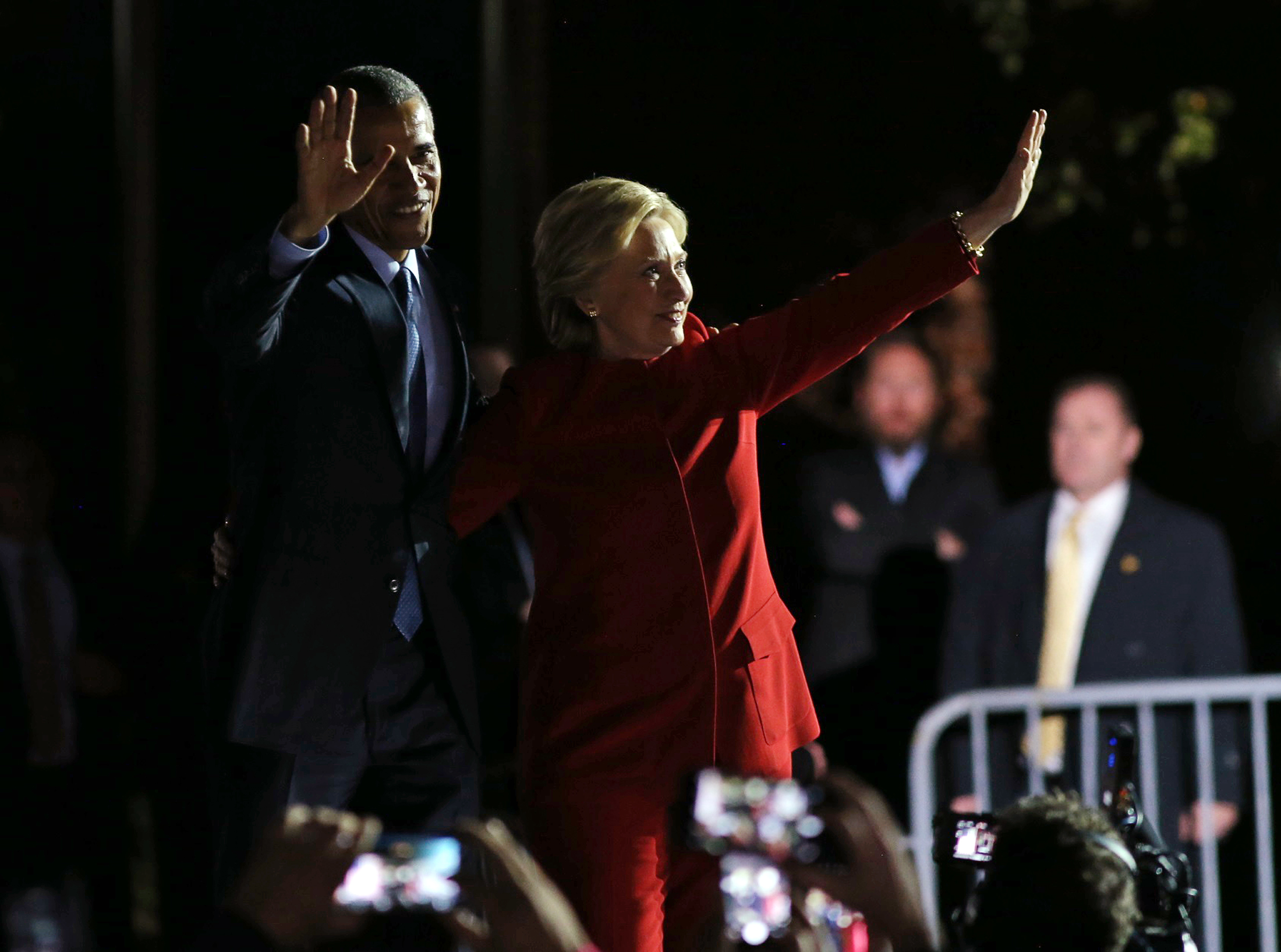Why Democrats just can't quit Clinton and Obama
Why can't Democrats think about tomorrow? Yesterday's gone. Yesterday's gone.


A free daily email with the biggest news stories of the day – and the best features from TheWeek.com
You are now subscribed
Your newsletter sign-up was successful
Democrats just had a golden opportunity to shore up support from activists in the party's left wing and take a step into the future. Not surprisingly, they blew it.
This was the first time in at least 12 years — after the last crushing presidential defeat for Democrats, in 2004 — that progressives genuinely cared about who would be the next chair of the Democratic National Committee. Immediately after Congressional Progressive Caucus co-chair Keith Ellison (D-Minn.) announced his intention to run the DNC, Bernie Sanders threw his support behind him; in less than 24 hours, a quarter of a million Sanders 2016 supporters were behind Ellison. Former Senate Democratic leader Harry Reid quickly endorsed him, as did his replacement, Chuck Schumer. Ellison seemed poised to win in a landslide.
Unfortunately, former President Barack Obama didn't see it that way, and actively campaigned for his former labor secretary, Tom Perez.
The Week
Escape your echo chamber. Get the facts behind the news, plus analysis from multiple perspectives.

Sign up for The Week's Free Newsletters
From our morning news briefing to a weekly Good News Newsletter, get the best of The Week delivered directly to your inbox.
From our morning news briefing to a weekly Good News Newsletter, get the best of The Week delivered directly to your inbox.
As New Republic's Clio Chang pointed out last week, the case most Perez supporters made for backing him over Ellison never amounted to much, only reassurances that he'd be just as progressive as Ellison. Few admitted that they thought Ellison was too liberal, or acknowledged that Ellison was the target of a smear that he's anti-Semitic — a particularly ugly charge against the first Muslim congressman.
Partly owning to the work Obama and his team put into the race, Perez won the DNC chairmanship by a vote of 235-200. That the defeat came coupled with a vote against a ban on corporate lobbying just poured salt into old wounds from the 2016 primary, where part of the argument against Clinton was that she was overly friendly with lobbyists.
This was a kick in the teeth for the left, no doubt. This was the first real chance to put a progressive into a position of power since November; instead, Democrats picked yet another favorite of the Democratic establishment. Democratic mandarins remain in a state of denial in which Clinton's popular vote victory excuses her Electoral College loss and the overall deterioration of the party over the past eight years.
This should serve as a reminder to the left, too: The calcified centrist organization of the Democratic Party isn't the only way to pursue change, nor is it even particularly the best way. Many of the most successful political movements in recent years have succeeded in part by bending politicians to their will, not the other way around. In that sense, maybe progressives shouldn't try to seize control of the DNC. They should go around it.
A free daily email with the biggest news stories of the day – and the best features from TheWeek.com
Enacting lasting change means starting at the bottom with a bunch of people organized around ideas rather than a bunch of people organized around a personality. For instance, activist movements like Black Lives Matter and the Moral Movement in North Carolina have dragged the Democrats to the left on issues of criminal justice reform and civil rights, providing a roadmap for other progressive groups to influence change through a diverse coalition of the working class.
Our Revolution, the successor to Bernie Sanders' campaign, is endorsing and supporting candidates from the local level up, and the new group Justice Democrats is aiming to "replace every establishment politician in 2018." Even inside the structure itself, The Wall Street Journal reported last week, progressives from the Sanders camp are taking over local Democratic committees and state parties from Hawaii to Nebraska. Call it reforming the party or entryism; whatever it is, it's starting to work.
Saturday's DNC result shows that the old guard of Democratic elites aren't going to relinquish power gracefully or easily. The Democratic Party's powerbrokers remain enthralled by what they see as the glory days of the Clinton and Obama years, but those days are gone. And if activists keep pushing in the streets, town halls, and meeting rooms all over the country, sooner rather than later, Democratic elites will have to submit to reality in the name of self-interest.
Paul Blest is a journalist living in Raleigh, North Carolina. He's a former staff writer for INDY Week and has written for New Republic, Jacobin, VICE, and Salon.
-
 ‘Those rights don’t exist to protect criminals’
‘Those rights don’t exist to protect criminals’Instant Opinion Opinion, comment and editorials of the day
-
 Key Bangladesh election returns old guard to power
Key Bangladesh election returns old guard to powerSpeed Read The Bangladesh Nationalist Party claimed a decisive victory
-
 Judge blocks Hegseth from punishing Kelly over video
Judge blocks Hegseth from punishing Kelly over videoSpeed Read Defense Secretary Pete Hegseth pushed for the senator to be demoted over a video in which he reminds military officials they should refuse illegal orders
-
 The billionaires’ wealth tax: a catastrophe for California?
The billionaires’ wealth tax: a catastrophe for California?Talking Point Peter Thiel and Larry Page preparing to change state residency
-
 Bari Weiss’ ‘60 Minutes’ scandal is about more than one report
Bari Weiss’ ‘60 Minutes’ scandal is about more than one reportIN THE SPOTLIGHT By blocking an approved segment on a controversial prison holding US deportees in El Salvador, the editor-in-chief of CBS News has become the main story
-
 Has Zohran Mamdani shown the Democrats how to win again?
Has Zohran Mamdani shown the Democrats how to win again?Today’s Big Question New York City mayoral election touted as victory for left-wing populists but moderate centrist wins elsewhere present more complex path for Democratic Party
-
 Millions turn out for anti-Trump ‘No Kings’ rallies
Millions turn out for anti-Trump ‘No Kings’ ralliesSpeed Read An estimated 7 million people participated, 2 million more than at the first ‘No Kings’ protest in June
-
 Ghislaine Maxwell: angling for a Trump pardon
Ghislaine Maxwell: angling for a Trump pardonTalking Point Convicted sex trafficker's testimony could shed new light on president's links to Jeffrey Epstein
-
 The last words and final moments of 40 presidents
The last words and final moments of 40 presidentsThe Explainer Some are eloquent quotes worthy of the holders of the highest office in the nation, and others... aren't
-
 The JFK files: the truth at last?
The JFK files: the truth at last?In The Spotlight More than 64,000 previously classified documents relating the 1963 assassination of John F. Kennedy have been released by the Trump administration
-
 'Seriously, not literally': how should the world take Donald Trump?
'Seriously, not literally': how should the world take Donald Trump?Today's big question White House rhetoric and reality look likely to become increasingly blurred
